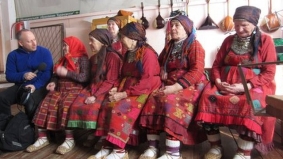
"My father went off to war and never came back," Natalya recalls. "Life was tough after the war. We had no bread, no food, few clothes and no shoes. We walked barefoot. When it rained you'd pull up your skirt and run. Your legs would get covered in mud up to your knees: that's what we called 'wearing boots'."
The Buranovo Grannies hail from the Udmurt minority
Natalya was born in the village of Buranovo, 700 miles east of Moscow in Russia's Udmurtia Region. She has spent her life "working night and day" on the local collective farm.
But now her life has taken an unexpected turn.
At the age of 76, Natalya Pugacheva is set to become the oldest ever participant in the Eurovision Song Contest. The village folk choir in which she sings, The Buranovo Grannies, have won the right to represent Russia in this year's contest.
Endangered language
"Come on and dance! Come on and dance. Boom Boom! Ha ha ha!!" Natalya sings me the English chorus, then bursts out laughing. "I was so surprised we won the Russian heat," she admits. "We're a bunch of old women. And we came first!"
Down at the village hall, The Buranovo Grannies rehearse their Eurovision entry.
Most of the singers are in their mid-70s but these Babushkas still have plenty of "Boom bang-a-bang". They breeze about the stage in beautifully embroidered red dresses and necklaces made of old coins. Their song, Party for Everybody, is a cross between a traditional folk tune and an upbeat disco number.
Although the chorus is in English, most of the song is in their native tongue, Udmurt.
"The cloth is on the table," they sing, "Our sons will soon be here, The pies are in the oven, Our hearts are full of cheer!"
Udmurt is on Unesco's list of endangered languages. Choir member Olga Tuktareva hopes their Eurovision appearance will go some way to protecting their mother tongue and culture.

Steve found the local hospitality included home-made vodka
"Udmurts are a tiny nation," Olga explains to me. "And every small nation wants to be heard and seen. So it is a great opportunity to show this very small, very kind, very hard-working and patient people. And to prove that even elderly people can get things done and have a joyful and spiritually rich life."
Udmurts are not only kind and patient. They are also extremely hospitable. After the rehearsal, one of the grannies approaches me with a small bottle. The label indicates it's a bottle of mineral water.
"Here, try this," she tells me with a cheeky smile, "I made it myself!"
It wasn't mineral water. It was home-made vodka.
The Buranovo Grannies have another reason for taking part in the song contest: a more spiritual one.
'Who will milk the cow?'
Their village has no church. Josef Stalin knocked it down more than 70 years ago.
The villagers have converted an abandoned food shop into a prayer house. But now the singing Babushki are hoping that a little bit of Eurovision glory will help them raise money to build a brand new church.
"I think God is sending us to Eurovision," singer Granya Baisarova tells me, "He's helping us build that church."
Mind you, with all the household chores to get done, there is not much time for Eurovision preparations. Natalya Pugacheva admits her husband is not too keen on the idea of her gallivanting off to the Eurovision final.
"After all," she tells me, "if I'm away singing, who'll milk the cow? But my children want me to go. They keep telling me, 'Don't listen to Dad, you go and sing!'"
And how do the Buranovo Grannies feel about competing against one of the pop world's most famous granddads, 75-year-old Engelbert Humperdinck who will be representing the United Kingdom in this year's Eurovision Song Contest?
"I'd never heard of him," admits one of the grannies, Galina Koneva. "But we're so looking forward to meeting him."
They have even started putting together an Udmurt version of one of The Hump's greatest hits - Release Me. It's their musical greeting - from Russia… with love.
By Steve Rosenberg
BBC News, Buranovo, Russia






